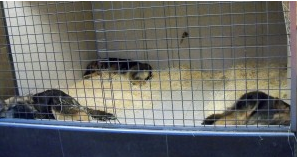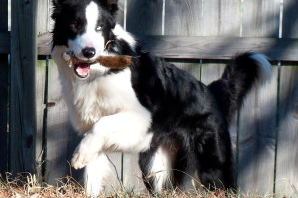Behavior issues are the primary reason why owners give up their pets. We’re all talking about the latest behavior modification technique, and often blame poor handling or inexperience, but at the core of many behavior problems lies a basic genetic predisposition of the dog to react in certain ways. With less emphasis on physical traits, and more focus on eradicating certain behavioral traits, breeders could make a real difference in the welfare of our canine companions.
Today’s modern urban lifestyle forces dogs to put up with many stressful situations. The demand to be highly social and friendly has increased and our acceptance for some of their natural drives has diminished. Dogs are required to be more tolerant towards one another as well as towards people. A dog’s genetic predisposition for adaptability, confidence and friendliness, are big advantages. Those traits will increase his chances of staying in his initial family of adoption and living a good life.
 A dogs’ behavior is determined by both his genetics and his interactions with the environment. In other words the dog’s genetics will define, or predispose him to reacting in certain ways to different situations. Most trainers are familiar with the basic drives of today’s breeds and some breeds will present behaviors that will be difficult to live with. Breeds such as Border collies are known to be compulsive herders that may present real challenges when brought into a city lifestyle. Beagles may create problems to those with a low tolerance to barking. A Weimaraner’s need for activity will often wear out their owner, and so forth…
A dogs’ behavior is determined by both his genetics and his interactions with the environment. In other words the dog’s genetics will define, or predispose him to reacting in certain ways to different situations. Most trainers are familiar with the basic drives of today’s breeds and some breeds will present behaviors that will be difficult to live with. Breeds such as Border collies are known to be compulsive herders that may present real challenges when brought into a city lifestyle. Beagles may create problems to those with a low tolerance to barking. A Weimaraner’s need for activity will often wear out their owner, and so forth…
 While bred for health or confirmation (AKC standards), certain breeds have also developed behavioral traits that may compromise their relationship with unsuspecting owners. We mostly expect aggression issues in breeds such as pit bulls or Rottweilers, but they’re also quite common in other breeds such as English Springer Spaniels, Doberman Pinschers, Toy Poodles, Lhasa Apsos and Cocker Spaniels (Borchelt, 1983). Even within the same breed, not all dogs are born equal when it comes to trainability, aggression thresholds, reactivity to environmental stimuli, etc… It only took 5 generations to obtain lines of dogs that are more nervous than typical. Those dogs were timid, less active, less curious and sometimes catatonic when people approached them (Murphree et al. 1974). This study also pointed to the limits of how much we can affect those behaviors through behavioral and pharmaceutical therapy, leaving owners with limited options. Environment will affect our dogs’ behavior but, even if we strive to provide the best of conditions and training, we’re still limited to increasing or decreasing the behaviors that are already part of the dogs’ genetic predisposition. Many will tend to automatically attribute mishandling as the cause of a shy dog’s behavior, when even in the most gentle of hands, genetics coupled with lack of socialization could be the cause.
While bred for health or confirmation (AKC standards), certain breeds have also developed behavioral traits that may compromise their relationship with unsuspecting owners. We mostly expect aggression issues in breeds such as pit bulls or Rottweilers, but they’re also quite common in other breeds such as English Springer Spaniels, Doberman Pinschers, Toy Poodles, Lhasa Apsos and Cocker Spaniels (Borchelt, 1983). Even within the same breed, not all dogs are born equal when it comes to trainability, aggression thresholds, reactivity to environmental stimuli, etc… It only took 5 generations to obtain lines of dogs that are more nervous than typical. Those dogs were timid, less active, less curious and sometimes catatonic when people approached them (Murphree et al. 1974). This study also pointed to the limits of how much we can affect those behaviors through behavioral and pharmaceutical therapy, leaving owners with limited options. Environment will affect our dogs’ behavior but, even if we strive to provide the best of conditions and training, we’re still limited to increasing or decreasing the behaviors that are already part of the dogs’ genetic predisposition. Many will tend to automatically attribute mishandling as the cause of a shy dog’s behavior, when even in the most gentle of hands, genetics coupled with lack of socialization could be the cause.
In my experience working professionally with dogs, I have always known that genetics were important, but how much they influence the ability for a dog to grow up into a friendly, confident and safe dog hadn’t struck me until I started my job overseeing the training of service dogs in prison. Most breeders watch their pups go to individual owners so it’s very hard to determine if one trait or another is due to the breeding itself or to the way the pups were treated in the family. Over the past few years, I have watched entire litters of puppies grow up in a very controlled environment with living and training conditions that are as identical as we could possibly get. The influence of genetics really hit me when I witnessed the same behaviors, such as resource guarding in golden retrievers, or distractibility and reactions to moving objects like lights or leaves, develop in almost all siblings, even when living in separate facilities.
According to Houpt (2007), we’re only steps away from finding the genes responsible for canine aggression, but in the meantime, no matter how beautiful dogs can be, if they have shown any signs of aggression, or other problematic behaviors, they should not be bred. With today’s advances on dog’s behavior, training and cognition, we have better tools to deal with some of the common issues, but at the basis of many of them lie genetic influences that could have been avoided through more intentional breeding. Breeders are at the forefront of our dog’s welfare and reproduction practices should focus on developing dogs that have the best chances of making good pets.
There are plenty of responsible breeders who care about their dogs’ health as well as their chances to a great life as a pet. As consumers, we’ll encourage and validate those we choose to give our money to. So, just like we’re ready to buy the cheapest items from stores that promote products from China or poor animal husbandry, as long as we’re ready to pay for poorly selected dogs, we’re encouraging practices that lead to the suffering of our companions. As dog lovers, we have the power to make a real difference in how dogs are bred, for our own benefit, that of the dogs, and maybe even to society with fewer animals ending up at the pound.
Jennifer Cattet Ph.D.
Related articles
- Behavior Differences in Dogs from Pet Stores Versus Breeders (psychologytoday.com)
- http://www.sciencedaily.com/releases/2010/05/100525090552.htm



EJH
Some of what you say here worries me a little bit.
As a ‘behavioural consultant’ I know just how bad people are at diagnosing their dogs’ problems.
I have been to see dogs who were “aggressive- we’re afraid we’ll have to have her destroyed” only to find a shy timid little thing that had been kicked by the neighbour — so she barked at him!
On the other hand I’ve been to see a dog who was ‘almost perfect — we just have problems calling him to come back sometimes’ and found a dog with quite severe aggression to both strangers and his own family.
I also know that most cases of ‘aggression’ I see in dogs is almost entirely caused by poor training or management. The problem with the second case cited above was that the people saw the aggressive behaviour as ‘desirable’ 🙁
Then I also know that the Police here like to source their dogs from the pounds — BEFORE they’ve been ‘temperament evaluated’ because they say almost certainly a good dog will fail the temperament test.
PS. I’ve always found Rotties to be the most gentle and laid back dogs — ratehr like Bull Mastiffs.
I would suspect that any ‘aggression’ issues with Rotties are due to their training and rearing.
Mostly I have trouble with the terrier breeds, yet they are popular as family pets! ?
i’ve also found that poor eyesight can be a contributing factor that leads to ‘aggression’
Just a thought, but it almost seems like some dog owners go to a breeder for a “sound” puppy and then assume the dog will naturally grow up to be friendly, social and not aggressive. I guess I’ve just personally seen this happen a few times, and then the dog ends up having issues due to a lack of training/socialization/exercise, etc.
I guess, like you said, both genetics and environment are so important.